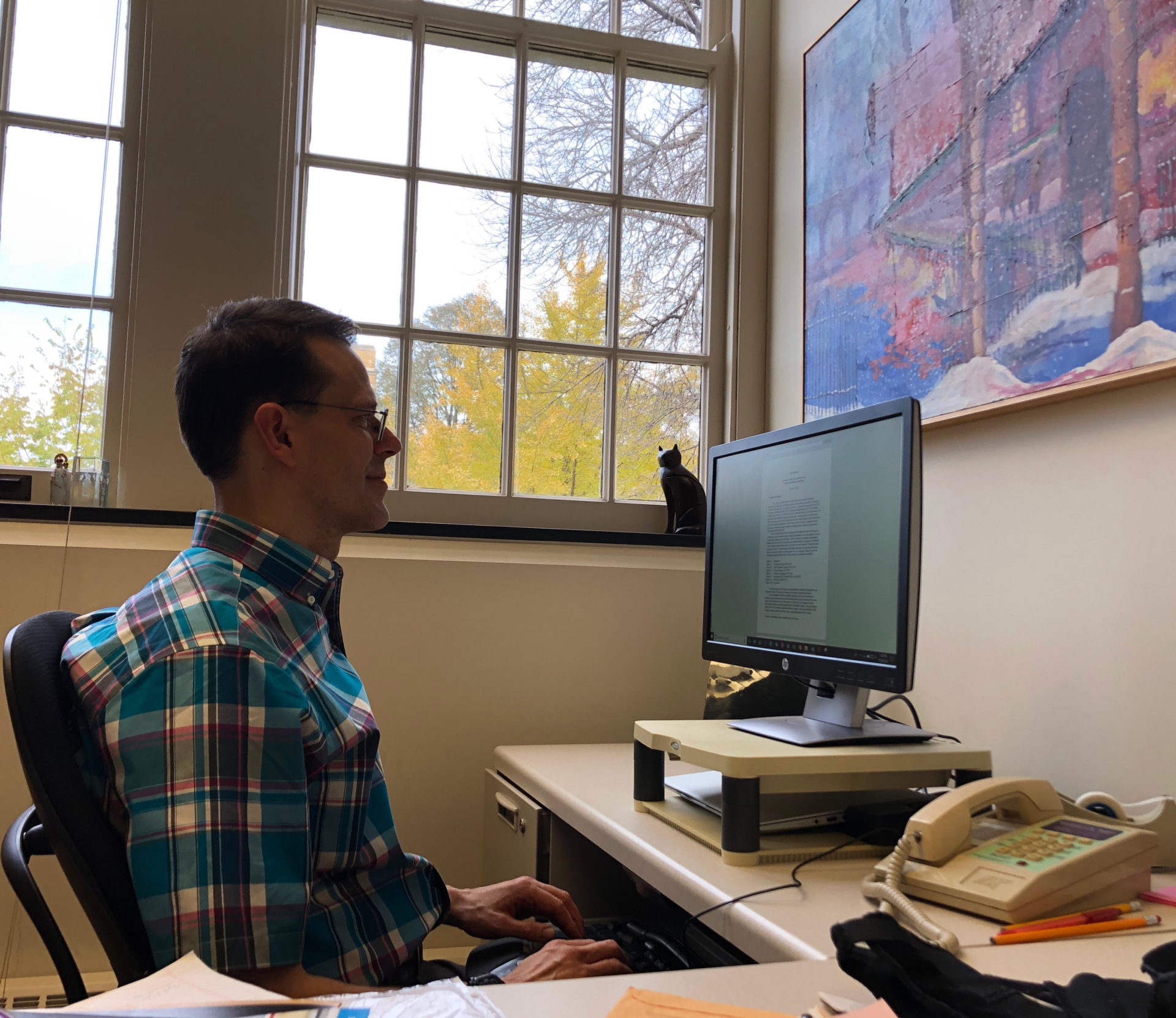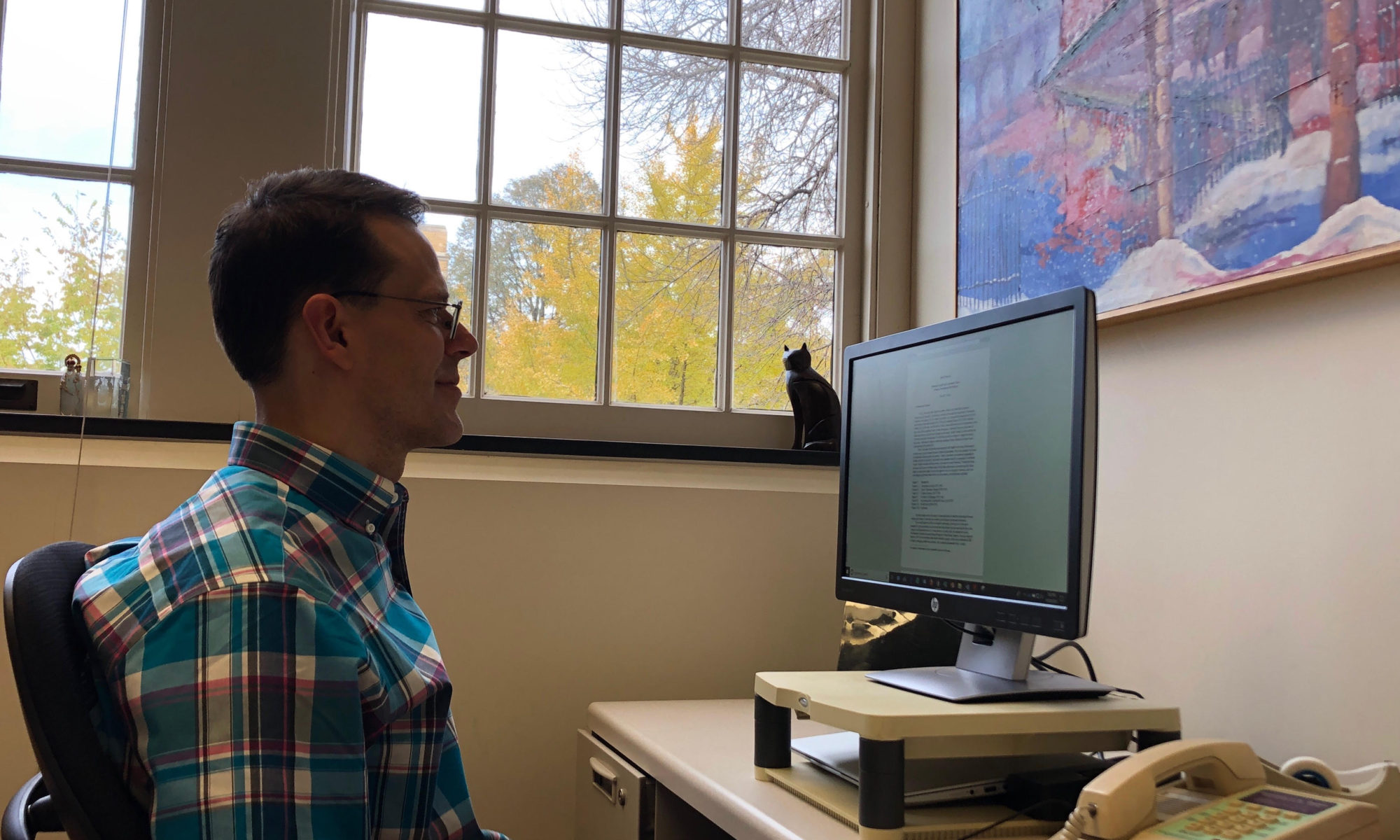
Professor Ted Ulrich looks over lecture notes on a computer monitor. Ulrich recently completed a 10 month trip to India researching its independence movement. (Burke Spizale/TommieMedia)
After receiving a Fulbright scholarship, St. Thomas theology professor Ted Ulrich spent 10 months in India researching its independence movement and will present his findings in a series of lectures on campus.
There will be three lectures in the series, in the Anderson Student Center from 12:00-1:10 p.m. The first lecture is “The Early Days of India’s Independence Movement and Its Religious Dimensions” on Nov. 5. Two more lectures concerning India’s independence movement will follow on Nov. 12 and 19.
“In my proposal to Fulbright, I included the idea of giving talks, because the idea behind Fulbright is to disseminate knowledge,” Ulrich said.
According to Ulrich’s research assistant, Arumugam Bosco, the series will show students how religion is used by extremists and how to interpret difficult texts that seem to condone violence. In addition, it will show how social justice activists use religion and how it can be used positively.
Ulrich was first introduced to this issue in 2004 while participating in a National Endowment of the Humanities program. Ulrich visited India for the first time in 2005, where his relationship with Bosco blossomed.
“When Dr. Edward Ulrich visited India for the first time to explore the historical sites of Aurobindo in Pondicherry and Calcutta and Gandhi in Gujarat, I committed myself to assist him, accompanied him to all the sites, safeguarded him for the noble research works in India,” Bosco wrote in an email.
After Ulrichs first trip to India, his fascination with the issue has led him back seven times since.
“My first two trips were to learn more about India and to set up the foundations for my study abroad trips and to support my research on Aurobindo,” Ulrich said. “Four of those trips were study abroad trips that I led from St. Thomas and the seventh trip was for language study.”
In order to do the research required for this lecture series, Ulrich spent five summers preparing an application for a Fulbright Grant. After receiving the grant, Ulrich embarked on his eighth trip to India spending a total of 10 months there, where he gave lectures on several topics, such as the history of Hindu-Christian dialogue, and researched issues of violence and nonviolence within India’s independence movement.
As part of Ulrich’s teaching responsibilities, he traveled to several universities in India to present lectures and according to Bosco, captivated his audience.
“He attracted the sweet hearts of the students wherever he addressed,” Bosco wrote in an email.
Much of Ulrich’s research focused on Sri Aurobindo Ghose and Mahatma Gandhi. These leaders differed on the role of violent resistance or nonviolent resistance for India to achieve independence.
“Mahatma Gandhi is considered an apostle of peace who led India to independence through non-violent resistance,” Bosco wrote.
Aurobindo was one of the earliest leaders in India’s independence movement and helped pave the way for Ghandi. However, he supported active resistance when necessary.
“His formal position was that when the British become violent, Indians need to be ready to use violence back.” Ulrich said.
The biggest thing Ulrich gained from the trip was a chance to immerse himself in Gandhi’s life and thought, he said.
To further spread his research, Ulrich has written a few articles on the subject. He is also laying the foundations to write a book.
“I predict that it will take several years. The collective works of Aurobindo are 36 volumes and the collected works of Gandhi are about 100 volumes,” Ulrich said. “The good and thorough job is going to take some time.”
Burke Spiale can be reached at spiz8477@stthomas.edu.



